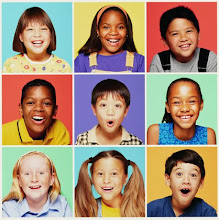Article: Technology Empowers Reading and Writing of Young Children
Jean Casey
What Can Parents and Teachers Do?
Fourteen years of research gathered by educators in the U.S. and Europe paint a much brighter trend and future for our young student. Today, using a computer with a talking word processor, he can now show others the ideas he has been unable to express with pencil and paper. He types his name, then “Mom,” and then every other word he knows. The computer reads back what he has just written; he sees it, hears it, reads it, and prints it out. He takes it home to read to everyone there and post on the refrigerator as proof of his ability to write and share his ideas.
 Daily writing on the computer leads to his words growing into sentences and stories. Since they are stories from his own language experience, he has made the connection: "What I can say, I can write, what I can write, I can read and print out for others to read as well. I am a writer, a reader, an author!"
Daily writing on the computer leads to his words growing into sentences and stories. Since they are stories from his own language experience, he has made the connection: "What I can say, I can write, what I can write, I can read and print out for others to read as well. I am a writer, a reader, an author!"
Superintendent Pat Eggleton leads Orcutt School district in Santa Barbara County, California. There, schools have six networked computers for writing in every classroom. Eggleton has observed the literacy growth of her students who began writing on computers in kindergarten and now excel in writing as sixth graders. They win local writing contests, have their own Web page, communicate through e-mail with students across the world, and use computers for their learning daily.
What Can Parents and Teachers Do?
Fourteen years of research gathered by educators in the U.S. and Europe paint a much brighter trend and future for our young student. Today, using a computer with a talking word processor, he can now show others the ideas he has been unable to express with pencil and paper. He types his name, then “Mom,” and then every other word he knows. The computer reads back what he has just written; he sees it, hears it, reads it, and prints it out. He takes it home to read to everyone there and post on the refrigerator as proof of his ability to write and share his ideas.
 Daily writing on the computer leads to his words growing into sentences and stories. Since they are stories from his own language experience, he has made the connection: "What I can say, I can write, what I can write, I can read and print out for others to read as well. I am a writer, a reader, an author!"
Daily writing on the computer leads to his words growing into sentences and stories. Since they are stories from his own language experience, he has made the connection: "What I can say, I can write, what I can write, I can read and print out for others to read as well. I am a writer, a reader, an author!"
Superintendent Pat Eggleton leads Orcutt School district in Santa Barbara County, California. There, schools have six networked computers for writing in every classroom. Eggleton has observed the literacy growth of her students who began writing on computers in kindergarten and now excel in writing as sixth graders. They win local writing contests, have their own Web page, communicate through e-mail with students across the world, and use computers for their learning daily.
What Can Parents and Teachers Do?
What Can Parents and Teachers Do?
Fourteen years of research gathered by educators in the U.S. and Europe paint a much brighter trend and future for our young student. Today, using a computer with a talking word processor, he can now show others the ideas he has been unable to express with pencil and paper. He types his name, then “Mom,” and then every other word he knows. The computer reads back what he has just written; he sees it, hears it, reads it, and prints it out. He takes it home to read to everyone there and post on the refrigerator as proof of his ability to write and share his ideas.
Daily writing on the computer leads to his words growing into sentences and stories. Since they are stories from his own language experience, he has made the connection: "What I can say, I can write, what I can write, I can read and print out for others to read as well. I am a writer, a reader, an author!"
Superintendent Pat Eggleton leads Orcutt School district in Santa Barbara County, California. There, schools have six networked computers for writing in every classroom. Eggleton has observed the literacy growth of her students who began writing on computers in kindergarten and now excel in writing as sixth graders. They win local writing contests, have their own Web page, communicate through e-mail with students across the world, and use computers for their learning daily.

.jpg)
0 comments:
Post a Comment